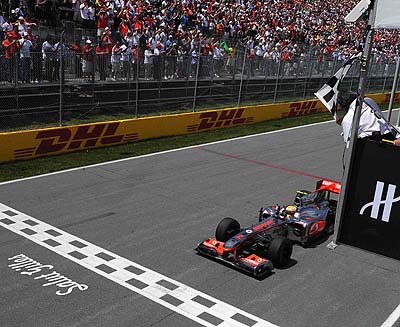


28/02/2011
NEWS STORY
 |
Only in F1 could a recession bring a boost to business. Last year Pitpass' business editor Chris Sylt revealed that the $2.8 billion loan which F1's majority owner CVC got to buy the sport in 2006 was racking up lower interest due to the recession. The loans incur interest at around 2% on top of what is known as the inter bank lending rate - the rate which banks charge to lend money to each other. When banks got into financial difficulty during the recession the interbank rate crashed to stimulate lending between them. F1 was the winner as this meant that the interest rate on its loans fell which allowed it to pay off more of the debt. A report by Sylt in the Telegraph reveals that the impact of this is F1 has now paid off a big chunk of its loans.
F1's boss Bernie Ecclestone told Sylt on Friday evening that a lot of the debt has been paid off and this was confirmed by David Bruce a vice president at debt information firm Markit Group, who says that one of F1's loans has been "paid down." Ecclestone and CVC aren't the only ones who are smiling.
US bank Lehman Brothers provided $550m of the money to CVC with a further $2.3bn believed to have come from the Royal Bank of Scotland (RBS). So, ironically, even though some would say that RBS and Lehman Brothers played a big part in bringing about the recession, it appears they have already made money back from F1 as a result of it. It wasn't a racing certainty.
CVC got the loans at the height of a boom market and there were concerns that F1's business model could crash as a result of the economic crisis and infighting in the sport. In June 2009 eight of the teams threatened to break away due to a dispute with the FIA and if this had gone ahead it would have made F1 less appealing to circuits and television companies which provide around 60% of the sport's €1.1bn annual revenue. In turn it would have made it tougher for F1 to meet its repayments on the debt. Ecclestone knew full well that the teams' threat was hollow but investors' got a little hot under the collar. As ever Ecclestone was right and the teams soon committed to staying in F1 when they signed a new Concorde Agreement in August 2009. It wasn't the only bump in the road.
Soon after CVC got the debt the lenders sold on the right to get the money back and as F1's fortunes swung so too did the price of the debt. The more likely it looked that F1 would implode, the lower the price of the debt fell because the bigger the risk that the money would not be repaid.
According to Markit, the F1 debt reached a low of 50p in the Pound in March 2009, three months after Honda pulled out of F1 in the midst of the recession. The debt price spluttered as BMW, Toyota and Renault followed Honda out of the sport but it had accelerated to 82.5p by the time the Concorde was signed. It has gone up ever since.
Last year F1 added South Korea to its calendar to give it 19 races - the highest ever number on its calendar. This boosted the total income from race hosting fees by 20% to $535m according to F1's industry monitor Formula Money. The sport also gained three new teams and they raced in one of its closest seasons with four drivers vying for the title in the season finale. It all showed the promise of F1. As interest in the upcoming season has increased the debt price has risen 2.1p since the end of January to a record high of 99p at 24 February. "You can't buy the debt now," Ecclestone told Sylt on Friday.
It is believed that RBS and Lehman Brothers still own some of the right to repayment of the debt and although it looks more secure than ever, the road ahead may not be so smooth. Last week the season-opening Bahrain Grand Prix was cancelled due to the civil unrest in the country and the $37m fee for hosting the race will not be paid. "There will be less money coming in," adds Ecclestone.
Despite this bump in the road, CVC is still on track to meet its obligations with the debt. By the end of 2009 F1's rights holder Delta Topco had $2.2bn of third party loans outstanding and during the year it repaid $178m of the money. As this goes down so too does the interest payments which frees up more money to repay the debt. F1 throws off plenty of cash to keep this process ticking over as the business has an operating profit margin of around 40%.
In 2008 Nick Clarry, CVC's UK managing director told Sylt that he hopes to repay $1bn of the debt by 2014. It is then expected that CVC will get out another loan to refinance the remainder and give itself a payout. CVC is expected to stay at the wheel as Ecclestone said last year that "lots of people have approached CVC," but they have all been rebuffed.